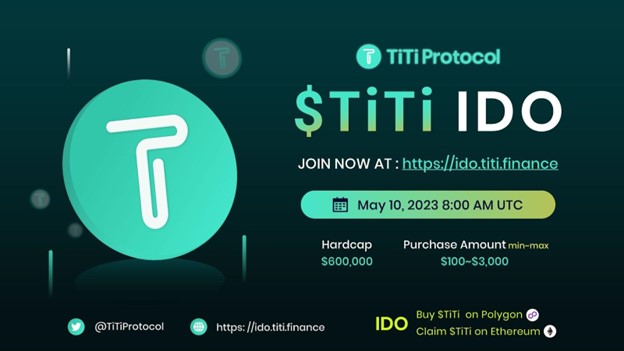On May 9, the decentralized stablecoin TiTi Protocol announced that it will launch the Ethereum mainnet in the next few weeks and plans to start IDO and the second round of airdrops. TiTi Protocol plans to start IDO on May 10, and users can go to https://ido.titi.finance to participate in IDO. Previously, TiTi Protocol had just completed the first round of airdrops.
What is TiTi Protocol?
TiTi Protocol is a fully collateralized, multi-asset reserve-backed, prevent bankrun, use-to-earn decentralized stablecoin that aims to provide diversified and decentralized financial services based on the crypto-native stablecoin system and autonomous monetary policy. The new paradigm of decentralized stablecoin TiTi Protocol is the first stablecoin that uses “Use-to-Earn” and has the function of preventing bankrun. TiUSD is a stablecoin issued by the TiTi protocol, and TiTi is the protocol’s governance token.
Previously, TiTi Protocol announced in April 2022 that it had completed a financing of US$3.5 million at a valuation of US$30 million, led by The Spartan Group, with participation from SevenX Ventures, Incuba Alpha, DeFi Alliance, Agnostic Fund, Fourth Revolution Capital (4RCapital), Solidity Venture, and other institutions, as well as other individual investors including 0xb1 (Fold Finance), Tascha and Nipun (Alpha Venture DAO), and Michael (Fantom).
In addition, TiTi Protocol has completed a 3-rounds smart contract audit by Slowmist, Hacken and Peckshield.
TiTi Protocol Mainnet & Airdrop & IDO
TiTi Protocol is the first ever “Use-to-Earn” decentralized stablecoin. It is officially announced that TiTi Protocol will be launched on the Ethereum mainnet in the next few weeks. Users can use and trade TiUSD to passively or actively earn protocol fees.
After the TiTi mainnet goes live, TiTi Protocol will inject a large amount of TiTi into the mainnet. Users can earn TiTi through yield farming, especially the original unilateral liquidity MMF function created by TiTi Protocol. Users only need to provide unilateral liquidity to earn TiTi. It’s free of risk and with a rather profitable APY! And in order to give back to early users, early TiTi rewards are very generous!
It is reported that TiTi Protocol has just completed the first round of airdrops a few weeks ago, and both new and old users in the community have the opportunity to receive airdrops. TiTi Protocol will plan to start the second round of airdrops after the mainnet goes live.
In addition, TiTi Protocol announced that it will kick off IDO on May 10, and users can go to https://ido.titi.finance to participate in IDO. This IDO provides a total of 10,000,000 TiTi tokens at a price of $0.06. IDO participating users will receive exclusive NFT and will be eligible for airdrops and other benefits in the future.
What is unique about the design of TiTi’s stablecoin (TiUSD)?
As a new star of decentralized stablecoins, the most unique feature of TiTi Protocol is that it can improve the liquidity and user acceptance of decentralized stablecoins under the premise of ensuring stability, and bring a new paradigm of stablecoin solutions through five core modules:
1. TiTi-AMM(M-AMM):Primary maket for TiTi mint and redeem
TiTi-AMM is the core mechanism for adjusting the TiUSD circulation, which makes a primary TiUSD market through specific trading strategies to maintain stability. Users can exchange their assets for another kind of asset they need at the agreed price. TiTi–AMM always provides users with bilateral orders for TiUSD bid & ask at $1. TiTi-AMMs greatly boost stablecoin onchain liquidity, increase capital efficiency and free from impermanent loss. Liquidity providers want to participate in liquidity mining, they only need to provide unilateral liquidity for TiTi-AMM to make a market.
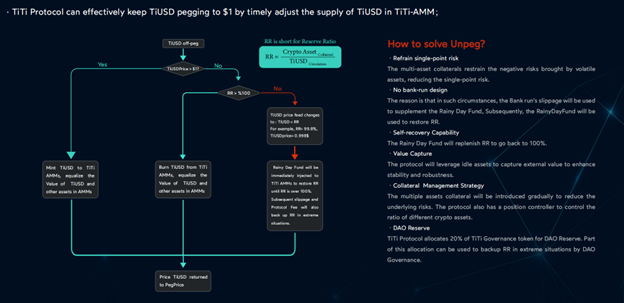
2. Multi-asset reserve: ETH, USDC, WBTC, DAI etc
First of all, TiTi is a protocol supporting multiple assets for stablecoin issuance. TiUSD is a stablecoin issued by ETH, USDC, WBTC, DAI, etc. In addition, TiTi has designed a Position Controller to actively control the collateral assets ratio. The design can refrain from single-point risk. Meanwhile, with multiple mainstream crypto assets as collateral, this will help break the ceiling for stablecoin issuance while others can not. Meanwhile, with multiple mainstream crypto assets as collateral, this will help break the ceiling for stablecoin issuance while others can not.
TiUSD is a fully on-chain, decentralized stablecoin backed by multiple crypto assets. TiUSD is backed by sufficient crypto assets (WBTC, ETH, USDC) in reserves, and the Rainy Day Fund provides continuous income. Multi-asset reserves effectively avoid single-point risks, making TiUSD more stable, and at the same time solve the two most important issues in the competition of decentralized stablecoins: stability and liquidity.
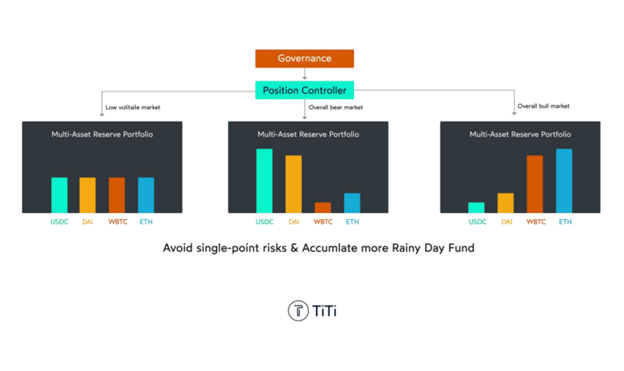
3. Reorders: The Most Efficient Peg Mechanism Ever
The pegging system in TiTi Protocol is called ReOrders. ReOrders has two core functions: a) By adjusting the number of TiUSD in TiTi AMMs, the Reorders can rebalance TiUSD and another token is AMMs so that the price of TiUSD is always kept at $1 in due time; b) By adjusting the number of Reserve Tokens in TiTi AMMs, on the premise that the total reserve value (collateral asset)of the protocol is equal to the circulating volume of TiUSD. Reorder can collect slippage during a market-making cycle. (In essence, ReOrders is similar to a market maker strategy running on TiTi AMMsThe pegging system in TiTi Protocol is called ReOrders. ReOrders has two core functions: a) By adjusting the number of TiUSD in TiTi AMMs, the Reorders can rebalance TiUSD and another token is AMMs so that the price of TiUSD is always kept at $1 in due time; b) By adjusting the number of Reserve Tokens in TiTi AMMs, on the premise that the total reserve value (collateral asset)of the protocol is equal to the circulating volume of TiUSD. Reorder can collect slippage during a market-making cycle. (In essence, ReOrders is similar to a market maker strategy running on TiTi AMMs.
The Reorders can cohesively make TiUSD pegging to $1 via reshape liquidity pairs value. Reorders are able to proactively collect slippage and allocate the resulting revenue to the Rain Day Fund and protocol fees, freeing protocol users from profiting through speculation. Compared with Rebase and Reweight, the trigger conditions of Reorders are more precise. According to the settings of TiTi Protocol, the Reorders algorithm can be triggered when the anchor price fluctuates by 5%, or every 30 minutes, to quickly restore the price peg and stabilize user confidence.
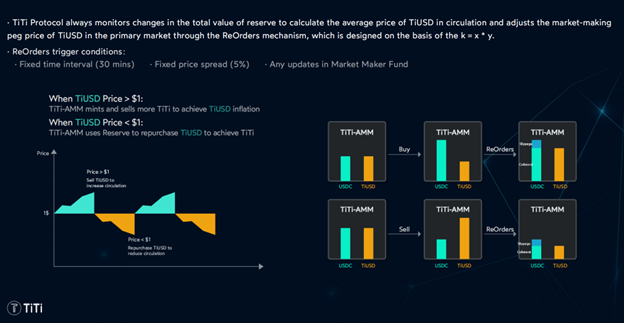
4. Use-to-Earn: A New Concept of Stablecoin Earnings
With the increasing market demand for decentralized stablecoins, TiTi Protocol invented the first Use-to-Earn mechanism to drive the organic adoption of decentralized stablecoins. Use-to-Earn is a brand-new concept of stablecoin income, which is actually to use stablecoin to passively or actively earn protocol fees.
Use-to-Earn’s technical solution is based on “Merkle Proof” to verify the user’s reward distribution on the chain. The off-chain part will calculate rewards based on the user’s use of TiUSD, and the algorithm and distribution model used to earn rewards It is mainly judged according to the way users use TiUSD.
TiTi hopes to stimulate the use-value of TiUSD as a trading medium, the incentive method for TiUSD users will not adopt Olympus’s stake mechanism. Instead, TiTi adopts Merkle Distribution’s Incentive distribution method, TiUSD users will be able to capture revenue while using TiUSD. We will design incentive behaviors based on operational goals. In the future, this right will be decided by DAO Governance.
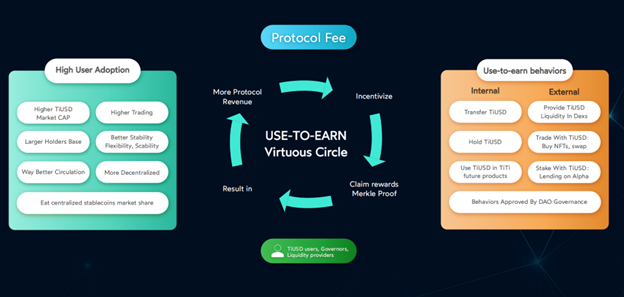
5. Aligned DAO governance
TiTi Protocol has a governance mechanism that incentivizes the long-term health of the stablecoin for the few decades and beyond, rather than short-term profit.auctioning governance tokens or future reserve yields. Many protocol core parameters and mechanism adjustment rights in TiTi Protocol will be transferred to community members to ensure the fairness of the protocol. In order to meet the governance needs of the protocol, TiTi Protocol will issue a governance token, TiTi, which is similar to Compound’s governance mechanism. TiTi is mainly used for proposals and voting.
Community-adjustable parameters and mechanisms in TiTi Protocol include but are not limited to:
1) The time period and price difference threshold triggered by the ReOrders mechanism;
2) The opening of the new M-AMM and the upper threshold of various assets;
3) The proportion of system revenue allocated to Rainy Day Fund;
4) The added value of market making used to motivate MMF;
TiTi Protocol aims to bring a new type of elastic supply decentralized stablecoin solution to DeFi and Web3 that incorporates the Multi-Assets-Reserve mechanism.TiTi Protocol aims to bring a new type of elastic supply decentralized stablecoin solution to DeFi and Web3 that incorporates the Multi-Assets-Reserve mechanism. Compared with the existing stablecoin, such as USDT, DAI, FEI, etc., TiTi Protocol has six major advantages: decentralized, high capital utilization, more stable efficiency guaranteed by risk-proof reserves and multi-asset reserves, and resistance to volatility risks.
As a fully decentralized stablecoin, TiUSD is pegged at $1, free from regulatory scrutiny and political constraints, and suitable for use as a medium of exchange. In addition, TiTi clears risks and is more user-friendly. Rain Day Fund can recover transaction slippage and serve as a continuous source of funds, which improves the protocol’s robustness against market fluctuations. TiTi Protocol’s new Use-to-Earn token economic design will maximize the benefits of DeFi users and realize the interoperability of decentralized stablecoins with other DeFi projects, bringing new solutions to the DeFi and Web3 ecology .
About TiTi Protocol
TiTi Protocol is a decentralized, 100% collateral-backed, crypto-native stablecoin, aiming to provide diversified and decentralized financial services based on the crypto-native stablecoin system and autonomous monetary policy.
TiUSD is the stablecoin issued by TiTi Protocol.
Join our telegram/Discord for the latest updates, follow us on Twitter, or read more about us on our Blog and Document!


